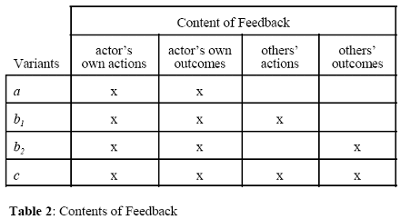The probably most obvious factor that influences learning is feedback. As shown in Figures 2 and 3, feedback closes the learning loop, and is therefore essential to all learning. Note that the concept of feedback is a broad one, in that it includes all kinds of information about the connection (causalities) of behaviors (actions) and consequences (outcomes) in a given situation. Furthermore, various sources of that information may be available, including observation of the behavior of others, of the consequences of that behavior, and sometimes communication with others.
Therefore, feedback information can have different contents, which in turn is important for learning as discussed below (see Table 2). Economic theories usually assume clear, complete, and instant feedback about the consequences of the actors own actions,[63] though some approaches differ in the assumptions about the availability of information about actions and outcomes of other actors. The latter type of information has been found to be important in some experiments,[64] but to date analysis of the effects of variations in content, quantity and quality of feedback seems rather eclectic.[65]
That effective learning “requires accurate and immediate feedback about the relation between the situational conditions and the appropriate response” (TVERSKY & KAHNEMAN, 1987, 90) has been acknowledged in the psychological literature,[66] and the obstacles to learning with respect to quality and quantity of feedback as “external blocks” are well known.[67] That is, learning is fostered the more often a certain type of situation is experienced, the more frequent and immediate feedback is within a particular situation, the better outcomes are attributable to actions (i.e., the less confounded feedback is), and the less noise exists.[68]
These findings apply at least to individual decision making but leave open the role of the content of information in interactive or strategic settings. In individual decision making tasks the content of feedback is relatively straightforward in that it includes only information about the outcomes of the actors own actions. In markets, and especially in games, feedback may also include information about the actions and outcomes of others. This gives the following four main variants of the content of feedback (Table 2).[69]

With respect to learning it seems reasonable to assume that the more the content of feedback reveals about the interaction, the easier is learning. Hence, learning is fostered when the content of feedback captures “more” relevant information (as in variant c compared to a). The effect of variant b1 compared to b2 is not straightforward.
In some settings it may be more valuable for an actor to know the actions of others, while in other settings knowing the outcomes of others’ actions may be more instructive (e.g., because actions can be inferred from outcomes). The discussed effects of content, quality, and quantity of feedback on learning are summarized in hypotheses in Section 4.3.
63 See CAMERER (1995, 608), who describes this characteristic of the economic analysis of learning as an important source of disagreement between psychologists and economists.
64 See, for example, ROTH & EREV (1995), who suggest that feedback about others’ actions may be more important for the convergence of learning processes than information about players’ own payoffs, though the latter seems to speed convergence. See also RAPOPORT ET AL. (1995, 19), who report some effect of feedback on prior beliefs, and EREV & RAPOPORT (1997, 19) who found that “public feedback” fosters learning compared to “personal feedback”.
65 On the difficulties of learning only from feedback about outcomes in a psychological view, see DOHERTY & BLAZER (1988).
66 In most real-life situations quality and quantity of feedback is much lower than commonly assumed in economic theory because (i) outcomes are delayed and not easily attributable to particular actions, (ii) variability in the environment may degrade the reliability of the feedback, especially where outcomes of low probability are involved, or/and when feedback is delayed, (iii) there is often no information about what the outcome would have been if another action had been taken, and (iv) most important decisions are unique and therefore provide little opportunity for learning, see EINHORN & HOGARTH (1978).
67 In addition to these external blocks to learning, KLEINDORFER, KUNREUTHER & SCHOEMAKER (1993, pp. 110) identify two types of internal blocks (ego defenses and cognitive biases) that hinder learning due to the human psychological makeup. These psychological obstacles to learning are not covered by the approach presented here, because the focus will be strictly on situational factors that can more easily be controlled in experiments.
68 Note that confounded and noisy feedback is not the same. See KLEINDORFER, KUNREUTHER & SCHOEMAKER(1993, 111) for examples.
69 Note that Table 2 does not apply to individual decision making, and that, for simplicity, it is assumed that the actor always knows her own actions and outcomes. Both assumptions must not necessarily hold since actors may forget their own past actions over time, and there may be situations with no feedback about the actor’s own outcomes (but the actions and/or outcomes of others). This case seems rather extreme so that it is reasonable to assume that in most situations some feedback about the outcome of the actor’s own actions is available; though it may be delayed, confounded, or noisy.
Prof. Tilman Slembeck
Next: Operationalization of Learning
Summary: Index